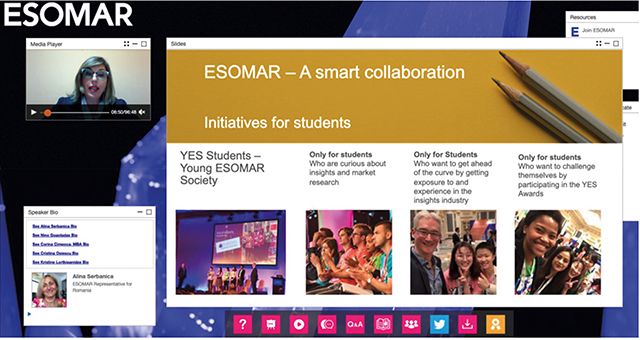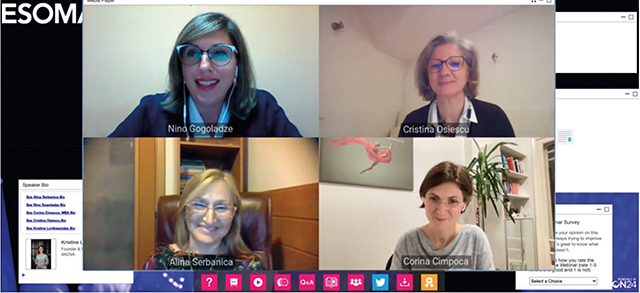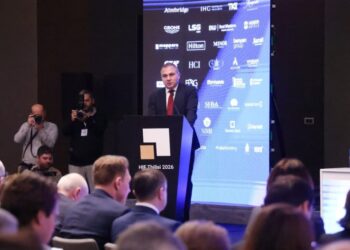Attracting young talent is critical for the dynamics of the industry
Market research encompasses many different methodologies, tools and techniques to help us understand human motivation, so that businesses and societies can better meet the needs of their consumers and citizens. And the “insights industry,” as it is known, is an attractive one, allowing professionals to be both creative and innovative. But creativity alone is not enough these days, as they also require knowledge of advanced statistics modelling, combined with the use of artificial intelligence and other digital technologies.
“Attracting young talent is critical for the dynamics of the industry and is the essential fuel for its future,” says Alina Serbanica, ESOMAR Representative, Romania. She, along with Nino Gogoladze, ESOMAR Representative in Georgia, united to create an online seminar this November designed for an audience including undergraduate, master program, and PhD program students and their university professors.
To find out more about ESOMAR and what it means for the future of market research and analytics, GEORGIA TODAY spoke to event organizer on the Georgian side, Nino Gogoladze, who is also Managing Director at TV MR GE, Nielsen Television Audience Measurement’s official licensee.
“ESOMAR is one of the biggest associations, a global community of researchers and research users from over 130 countries,” she tells us. “It is a community of insights and analytics, with almost 75 years of experience. First of all, it offers standards and experience, the ICC/ESOMAR Code and guidelines, and practical documents to help members get the most out of their data-driven projects. Also, it provides a very important tool to grow one’s business, the ESOMAR Directory, a globally-recognized listing of organizations providing data, research and insights services to end-users worldwide.
“Finding the right business partners around the world can be time-consuming,” Gogoladze notes. “Within the ESOMAR community, you have access at your fingertips to experts who can guide you to your next business partnership and can help you find the right expertise to drive your projects and ambitions forward.”

What does ESOMAR and its standards mean to a) you personally, as a businesswoman, and b) Georgia?
The ICC/ESOMAR Code of Conduct serves all organizations and professionals working with insights and analysis. The Code helps by outlining the accepted global requirements and practices for your projects and activities. The Code describes your key responsibilities towards participants involved in research, users and buyers of data and insights, and the general public. For the whole country, it means a high standard and quality of research.
What are Georgia’s “weaknesses” in terms of research capabilities/analytics compared to its European counterparts? Why do these exist, and what is the best way forwards?
Georgia’s research industry is considerably small, but very active, and provides high quality research. Georgia has an emerging market economy, a fact which affects all industries, among them, of course, the research industry. To overcome challenges, community members diligently combine the existing high level of expertise and knowledge with the best international practices and standards of research methodology. In 2020, local industry members in Georgia adopted the Code of Professional Ethics and Practices, which stems from both the ESOMAR code and from other leading professional global standards. The Code of Professional Ethics and Practices sees the Georgian research community pledging to use the highest standards.
* * *
November’s online seminar gathered students from multiple universities in Bucharest (Romania) and Tbilisi (Georgia), with specializations relevant to the research industry: sociology, psycho-sociology, marketing and market research, and business administration.
Over 100 students from the two countries attended, allowing them to get a taste of the ESOMAR community and the content it provides via so many resources. One of these is the ANA platform, an intelligent search engine that processes past, present and future publications into the corpus of knowledge by automatically extracting the keywords and concepts from any form of content. The platform includes over 150 webinars, some 10,000 research papers, 1200 dedicated reports, around 500 hours of streaming videos and over 120 complete magazines. Additional ESOMAR resources count conferences and research events, professionals/researchers and networking, industry guidance (code, guidelines & ethics), and the Young ESOMAR Society (‘YES’).
Guest speakers were invited from both countries, representing the diversity of the research industry. One guest speaker was from the internationally renowned company Nielsen, an American information, data and market measurement firm; another speaker represented the entrepreneurial spirit in the industry from MKOR, a boutique research company in Romania operated by young and creative professionals; and another was a young researcher and founder from ANOVA, a rapidly expanding Georgian innovative research company that prides itself on using the best international practices and standards of research methodology.
“Before the pandemic, we held several events per year in Georgian universities,” Gogoladze tells us. “During the pandemic, we adapted to the situation and started offering more online events. This last one was a collaboration with our Romanian colleagues, and we plan to continue working on connecting ESOMAR with professionals and students.
“The students seemed very engaged and curious. Indeed, we received more questions than we expected, about every presentation. And the day after the event, I received an e-mail from one of the attendees saying she wanted to join the YES society and asking more questions. I also sent a special offer to the universities and they are also now considering becoming corporate members of ESOMAR.”
By Katie Ruth Davies














